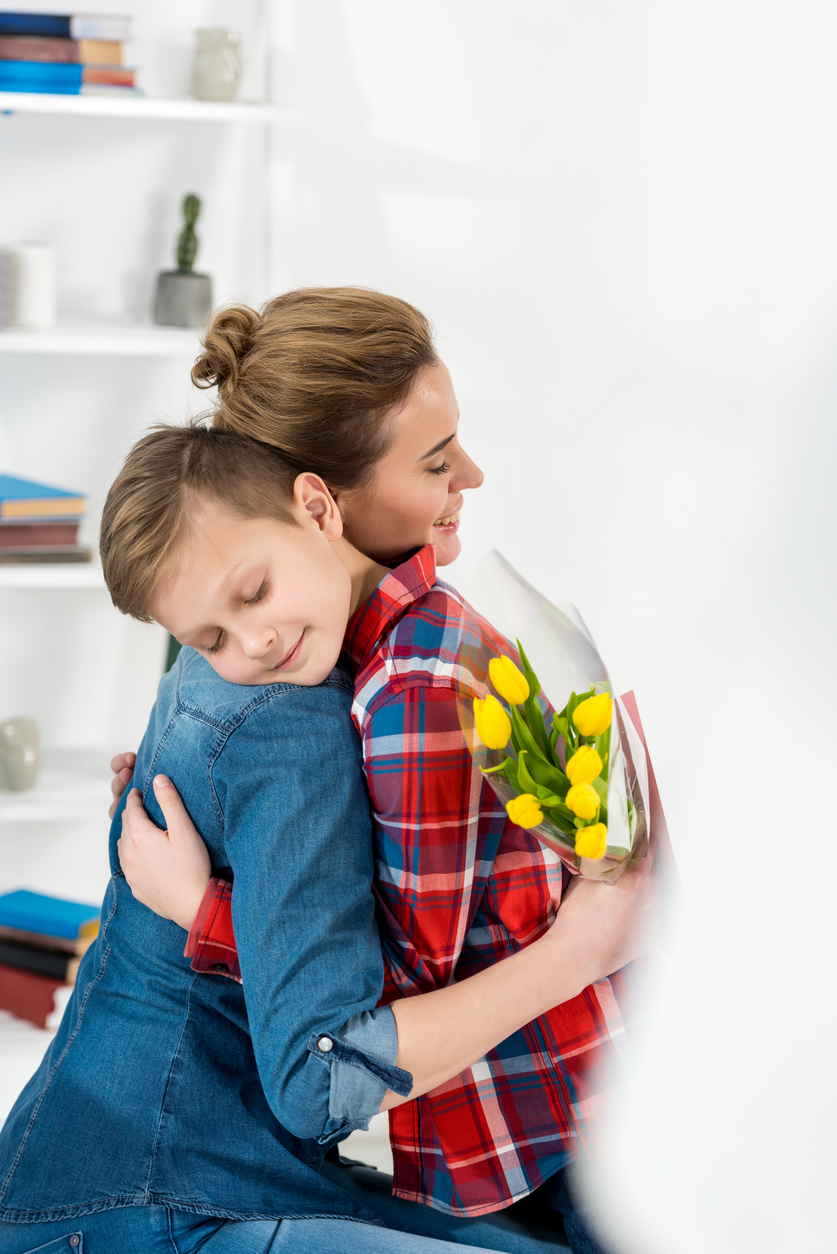Are you actively raising kind kids? Most parents will automatically say yes, but are you sure?
Surveys show that parents spend a lot of time and effort helping their kids succeed in school and sports. They also spend time trying to ensure their kids are healthy and happy.
But are they spending time teaching their children empathy? Or compassion? Or how to care for others?
The sad truth is kindness doesn’t always get as much attention as academics, athletics, or artistic achievements… but it should!
Kindness doesn’t happen overnight. It’s something that needs to be nurtured and encouraged.
In fact, most young children are naturally inclined to be both cruel AND kind.
Wait…what? Kids can be cruel? Yes, but hear us out while we explain.
Cruelty stems from anger and frustration.
Children don’t yet have the maturity to manage their negative emotions. So when they experience something negative, like another child taking their toy, they feel powerless and out of control.
Kids may lash out as a result and can demonstrate some cruel behaviors; like hitting or biting. It’s a “you hurt me, so now i’m going to hurt you” kind of deal.
In essence, cruelty is a misguided way for a child to try and take their power back, thereby regaining control.
Which is why teaching kindness beginning at a young age is so important.
Teaching Kids To Be Kind
While cruelty stems from feelings of anger and loss of control, kindness stems from self-awareness and empathy.
“Kindness isn’t something we’re born with, it’s something we’re taught.”
Robin Berman, MD, author of the book Permission To Parent
One of the most important concepts to understand when teaching children kindness is that while kids can be both cruel and kind, they cannot be both at the same time.
Therefore, if you actively encourage kindness in everyday life, you automatically reduce the amount of cruelty in your child.
Imagine it like a sliding scale…as kindness goes up, cruelty and meanness go down.
Our brains are wired to try and repeat actions that we found rewarding in the past.
If your child learns to see kindness as rewarding, they’ll choose the kind response again in the future. It will become their new default.
You’d think in today’s world of online cruelty and hate that parents would be more concerned than ever with raising kind kids. But that isn’t necessarily the case.
In a Harvard Study, 10,000 kids were asked to rank kindness, personal happiness, and achievement in order of importance. Not only did they rank achievement first, with personal happiness in second, and kindness coming in a distant third – they also said they believed their parents would agree that achievement is number one.
That stings a little. We may not be spending enough time focusing on kindness after all.
If you’re committed to raising kind kids that genuinely care about their fellow human beings, here are 9 parenting tips to put you on the right path.
We also include a reading suggestion that aligns with each tip to make the lessons easier for kids to understand.
For Our Complete Reading List: Amazing Books That Teach Kindness To Children
9 Tips For Raising Kind Kids
1. Model Kindness
Children are born imitators. They mimic the behavior of their role-models. And guess what? When they are little, their biggest role model is you.
So if they hear you talking about kindness and see you being kind to others, they will pick up the behavior.
“We can talk to our kids about being kind all day, but talking only gets you so far. We need to show them how to be kind too.”
Also, keep in mind that with school-aged children the behavior of the dominant kids in class tend to spread like wildfire. Cruel or kind, your child will likely follow their lead.
So in your quest for raising kind kids, don’t forget to partner with your child’s school.
Teachers know a lot about what’s happening with your kids’ peers. They can be a great ally.
Suggested Reading With Your Child: I am Kind (Positive Power)

2. Practice Kindness, A Lot
Look for opportunities to practice kindness with your kids. Make it part of your daily routine.
When you pick them up from school, get in the habit of asking “who were you kind to today?”
This can help put your child into the mindset of thinking about others, and how they relate to them.
RELATED: Random Acts Of Kindness For Kids – 30 Day Challenge!
When you witness your kids being kind, be sure to praise them. “I saw what you did for your brother, that was so helpful”.
In this way you amplify the neural patterns in their brain that equate kindness with reward so they’re more apt to choose kindness over cruelty in the future.
Suggested Reading With Your Child: How Full Is Your Bucket? For Kids
3. Be Mindful
Practice mindfulness exercises with your child. This increases self-awareness and self-control which, in turn, leads to less reactionary behavior.
By encouraging mindfulness you reduce the chance of cruelty being your child’s go-to response.
Suggested Reading With Your Child: I Am Peace: A Book Of Mindfulness
4. Manage Negative Emotions
Anger management skills for kids are an important part of the kindness equation.
Help your kids learn how to process their anger without being mean.
When you hear them lash out in frustration, help them identify the raw emotion they’re feeling.
RELATED: Top Ten Helpful Parenting Books
If your child says, “I hate you and I’m never playing with you again!” you can respond by saying, “you sound like you’re really mad”.
In this way you bring awareness to the negative emotion, without rewarding or punishing for it.
Your kids will begin to separate being angry from a need to hurt someone else.
Suggested Reading With Your Child: The Jelly Donut Difference: Sharing Kindness With The World
5. Teach Empathy
Empathy is one of the roots of kindness. Which is why teaching empathy to children is critical if you’re raising kind kids.
When a mean behavior happens, ask your child to put themselves in the other person’s shoes.
“What do you think he/she is feeling?” When kids can imagine the plight of others, it makes them want to help.
Suggested Reading With Your Child: Listening With My Heart: A Story Of Kindness and Self-Compassion
6. Teach The Right Way To Apologize
One of the best things you can do to help kids (and adults) be more kind is to teach them how to give meaningful apologies.
A meaningful apology is NOT a simple “I’m sorry”.
The apologizer has to acknowledge both what they did that was wrong (mindfulness) and why it was wrong (empathy).
“I’m sorry I called you a bad name, I know it really hurt your feelings.”
When a meaningful apology is given it brings together all the things we’ve been talking about; empathy, self-awareness, and emotional maturity.
The apology ends up becoming a kindness to the wronged individual.
Suggested Reading With Your Child: Zach Apologizes

7. Care Less About Winning
Instead of screaming from the sidelines to be number one, talk to your kids about teamwork and good sportsmanship.
There is nothing inherently wrong with winning, but children need to know that how you play the game matters just as much as the outcome.
Suggested Reading With Your Child: Sally Sore Loser: A Story About Winning And Losing
8. Read Books About Kindness
Research shows that reading kindness stories to kids helps them learn to understand and empathize with different perspectives.
Watching television doesn’t have the same empathy building benefits as a good book.
Suggested Reading With Your Child: The Invisible Boy
9. Minimize Digital Negativity
Perhaps one reason TV doesn’t offer the same boost in kindness as books is because it’s chock-full of negativity.
Your kids can easily be bombarded with scary news and negative imagery that decreases empathy and increases fear.
You want to raise compassionate hopeful kids? Get involved and know what type of media they’re consuming.
Be sure they’re exposed to programming with a positive and kind spin.
Suggested Reading With Your Child: The Energy Bus For Kids
Finally, be patient! Kindness is a skill that has to be learned and practiced, just like any other.
It takes time and dedication to build a kindness habit.
If you keep looking for opportunities to practice kindness in everyday interactions, and praise your kids when they’re being kind, they’ll learn to see kindness as intrinsically rewarding.
Before you know it, they’ll be teaching others how to be kind.
For Our Complete Kindness Reading List: Amazing Books That Teach Kindness To Children
If you really want to drive home the importance of kindness, try our Random Acts Of Kindness For Kids: 30 Day Challenge!
This is one of the best teaching activities you can do with your children.
It’s a great way to bond as a family. Your kids can experience first-hand how small acts of kindness really make a difference, especially when done intentionally.
Plus your kids learn about compassion, empathy, and service. It’s a win-win all around.
SPREAD KINDNESS EVERYWHERE AND SHARE this step-by step for raising kind kids.












